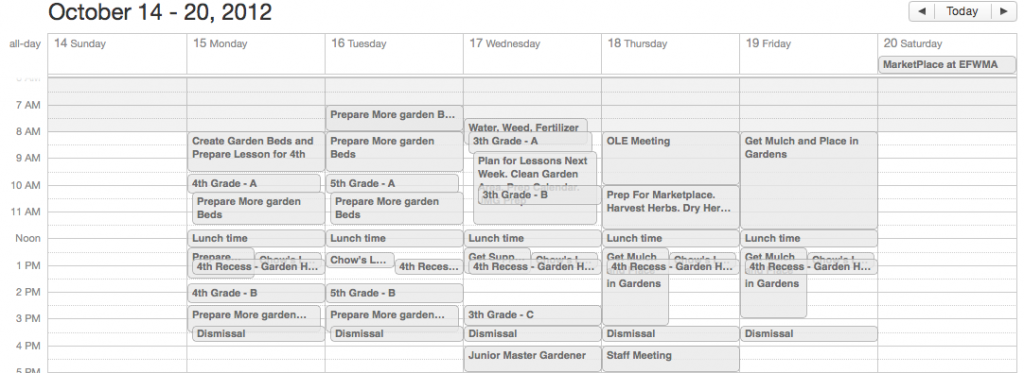It’s Monday morning, and there are plenty of things to accomplish during the week at work. Mulch needs to be spread, lessons need to be prepared, materials arranged for the lessons, plants watered, meetings to attend, and everything else that pops up in life. It’s becomes easy to get stressed and overwhelmed just thinking of the daunting tasks in one single day.
On the other side of the coin, big dreams and ambitions are lofty and somehow seem more attainable than all the small things that occur in the daily and weekly commotion. Leaving a suburban area to live on a farm out in the middle of no where, building community living centers, creating large aquaponics systems, and growing a food forest overnight.
The problem for me arises when the big dream is automatically pursued without conscientiously thinking about the tasks and steps to reach it. It’s the drive for the instant gratification of reaching the goal and the ignorance that makes it attractive. In a short amount of time, all of the small tasks begin to accumulate and overwhelm me and burn out my passion, energy, and time.
The issue percolates to other realms in society and not just in my own life. The pattern is emergent within teaching, parenting, and in all people who desire to live a better life and in a better world. The truth then lies in the details that connect these disciplines together.
Non-Cognitive Skills
It was about a month ago that I heard the episode of This American Life on Back to School. The episode focused on the concepts and ideas that should be taught in school and at home to ensure future success. The show begins with an economist, James Heckman, who took the task of looking at GED and high school graduates. The initial drive was from the idea that people who obtained a GED saved enormous amounts of time, energy and money.
 Heckman began to question though whether the GED graduates were as successful in life as the high school graduates. In a long term study across the board, high school graduates had better paying jobs, were married for longer periods of time, had less divorces, were better in the military, and the GEDs virtually dropped out of everything they started.
Heckman began to question though whether the GED graduates were as successful in life as the high school graduates. In a long term study across the board, high school graduates had better paying jobs, were married for longer periods of time, had less divorces, were better in the military, and the GEDs virtually dropped out of everything they started.
This raises the next question, what is it that divides GED students from high school graduates. The test the GED graduates take is supposed to challenge people on the same level as people in high school. The answer is a very elusive one, non-cognitive skills. Heckman defines it as character, social skills, conduct, and skills that are empiracly difficult to measure.
The study continues for another 10 years, and the economist begin to isolate the  non-cognitive skills that are the most significant. One that was found to be highly significant is self-control. In the late 1960s, a group of scientist observed children resisting the urge to eat a sweet treat in the present moment, enter the marshmallow test. The child would be sitting down and offered a cookie if they ringed a small bell on a table; however, if they waited 10 minutes to ring the bell, they would receive two cookies. It was literal torture for these children to wait, to delay satisfaction. In the long term though, the scientists tracked these peoples’ lives and continued to study how they would respond to temptations and life, and discovered more than what they intended. The children who were able to resist eating the sweet treat for longer periods of time succeeded far beyond others in stressful situations, maintaining friendships, and simply paying attention.
non-cognitive skills that are the most significant. One that was found to be highly significant is self-control. In the late 1960s, a group of scientist observed children resisting the urge to eat a sweet treat in the present moment, enter the marshmallow test. The child would be sitting down and offered a cookie if they ringed a small bell on a table; however, if they waited 10 minutes to ring the bell, they would receive two cookies. It was literal torture for these children to wait, to delay satisfaction. In the long term though, the scientists tracked these peoples’ lives and continued to study how they would respond to temptations and life, and discovered more than what they intended. The children who were able to resist eating the sweet treat for longer periods of time succeeded far beyond others in stressful situations, maintaining friendships, and simply paying attention.
As an adult now, the significance of learning this one tool is astronomical. As the years go on, the responsibility becomes larger. We are responsible for children learning self-control, are dealt a bigger role in society with access to tools, knowledge, and the future of this planet, and yet many of us have not mastered or even thought about the idea of mastering ourselves.
The trick is to make self-control a habit.
“Keep Your Goals to Yourself”
We’ll move away from self-control for a moment and move our attention to goals in general. Every new year, people create new years resolutions and strive to accomplish that task. The problem arises when people taut about their resolutions and share it with everyone that they talk to. In the end, they feel great from sharing and letting people know while getting positive feedback from their peers.
The issue arises in the mind. Derek Sivers delivers a great TED talk on the issue of keeping  your goals to yourself. By saying and sharing, we trick the mind into thinking the task has been accomplished by substituting the real genuine gratification of doing with one that is replaced by talking. Sivers concludes that we should keep those goals to ourselves or if we are tempted to say it we beat ourselves up with the harsh reality of what it’s going to take to complete it so we get no satisfaction from it.
your goals to yourself. By saying and sharing, we trick the mind into thinking the task has been accomplished by substituting the real genuine gratification of doing with one that is replaced by talking. Sivers concludes that we should keep those goals to ourselves or if we are tempted to say it we beat ourselves up with the harsh reality of what it’s going to take to complete it so we get no satisfaction from it.
A Few Tools
Overall, there is a reoccurring pattern in the realm of success and conquering dreams, delaying immediate results through self-regulation and control.
Changing behaviors though can require extra work, energy, and time to create a dedicated effort in manifesting a healthy feedback loop of successful results. There is no one singular method in creating new habits. However, the ones that have stayed with me the longest are slowing down, observing, meditating, and writing.
Slowing down is essential to realize of how much time is available to create our dreams. Rushing to solutions or conclusions often results in more work later on. It’s best to give things some thought beforehand. This vital step is crucial for those that follow.
Observations clue us into whether we are headed in the correct direction on the right assumptions. In a fast paced world, this process is easily blurred from an incorrect realization. For example, those who switch from conventional farming to organic may see horrendous results in the first year and come to a conclusion that organic is worse than using chemical pesticides. Coupled with slowing down, the observation may be deduced to a depletion of soil fertility and erosion.
Meditation for me is a method to clear the mind of the ambient noise and clutter from the day. It’s a moment that allows the mind to guide your thoughts, actions, and words.
Finally, writing, drawing, or blogging catalogs your new habits and ideas into a new reality. It tracks the slow progress and shows the mountain that is about to be conquered with hard work and dedication. One my favorite sermons was at Creation Flame, the Church of Awesome which was based on the epic journey. It’s not meant to be easy. Every huge feat that was accomplished was done with strife, hardships, and in the end a sense of accomplishment.
In fewer words, without the journey the end is meaningless.
Live with passion.

